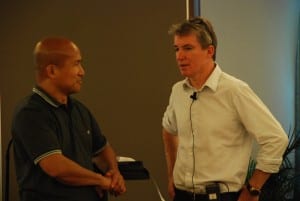For many, the terms ‘mentoring’ and ‘coaching’ appear to be interchangeable, but it is important to make a distinction between the two. Mentoring is usually considered to be an activity that takes place in a 1:1 situation with one person being the leader and the other the learner. In contrast, coaching is a partnership collaboration – that incorporates working alongside an individual to achieve shared aims.
My teacher coaching sessions support improvement in specific skill areas by providing another pair of “eyes and ears” to assess missed opportunities regarding behaviour and learning in the classroom. The collaboration will also allow the opportunity to compare and contrast specific student learning and socialisation needs within the classroom dynamic.
The benefits to schools that use teacher coaching techniques across the curriculum include:
- Increased understanding and control of the teachers own role in achieving success.
- Improved ability to communicate views and opinions.
- Enhanced abilities to make informed choices.
- Improved ability to see obstacles as challenges to be overcome.
- Improved emotional intelligence and the willingness to accept differing roles and others ideas.
- Increased ability to become pro-active in locating solutions to individual difficulties.
- Development of teamwork approaches to solving problems.
- Promotion of communication and understanding between all stakeholders.
- Development of a learning community.
The method or process of how teacher coaching can take place needs to be organised on a school by school basis. However, one format that is commonly used includes the following:
- Up to 4 Members of staff can be seen per school day.
- Verbal feedback is given to each member of staff visited that day with written feedback to follow.
- Feedback verbal or written sent to SMT if requested.
- Each member of staff is seen twice over a 4-6 week period.
The skills within the staff that will underpin the success in behaviour and learning, which will need to be supported include:
- Communication and interpersonal skills
- Creative thinking
- Active listening
- Reflective and open questioning
- Facilitating confidence in others and self to make mistakes and seeing these as learning opportunities
- Promoting motivation to achieve aims
- Being comfortable with ambiguity and disagreement
Coaching does not seek to judge or measure the teacher’s performance. It is an opportunity for the teacher to discuss and reflect on a number of situations that have taken place in the classroom on any given day.
For more information on Teacher Coaching please click here for more information.
